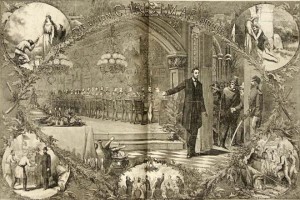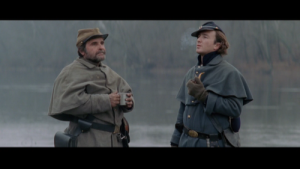By Matthew C. Hulbert
Popular narratives of the Civil War—and of World War I and World War II, for that matter—are replete with stories of soldiers putting aside their martial differences to celebrate Christmas. We hear of men setting down their arms and leaving their breastworks to be “normal,” if only for a single, special day. Then, once the holy day has passed, they return to the business of killing each other with gruesome efficiency. A precious few of these tales are actually true, while many more still are wishful thinking at best and entirely apocryphal at worst. In either case, though, they illustrate how our most basic inclination is to understand wartime holidays in romantic fashion; that is, through the hearts and minds of gallant, civilized soldiers from the regular rank and file—men serving far from home and hearth, but still managing to muster a little holiday spirit.
How did we develop this inclination? In part, it was to forget episodes of Yuletide degeneracy like this one from the Civil War Governors of Kentucky DDE database:
On Christmas Eve, 1863, John Cole approached his friend R. E. Finch and, for reasons unexplained, “pulled Finches whiskers.” Seeing as both men were “considerably under the influence of Liquor,” this affront to Finch’s mustache quickly escalated and—not surprisingly in Civil War Kentucky—would end with an attempted homicide. After having his whiskers pulled, a stunned Finch attempted to retreat, but Cole followed him outside and threatened to cut his throat. Cole then allegedly reached into his pocket in a menacing fashion. Now fearing for his life, Finch remarked that “if Shoot is your game here goes” before drawing a concealed pistol of his own and shooting Cole in the groin. As Cole fell to the ground, he theatrically announced the obvious to onlookers: he’d been shot!
At first glance, the sad saga of Cole and Finch doesn’t make for a very festive or heartwarming vignette. But then again, is the mistake all ours to expect the homefront of a war-torn border state to have been festive or heartwarming in the first place? After all, Kentucky wasn’t just at the center of a broader struggle between civilizations—as a microcosm of that conflict, it was also a place seemingly at war with itself. Citizens on the homefront, men like Cole and Finch, were well armed. (Parents in the 1860s weren’t nearly as worried about children shooting an eye out…) They had easy access to copious amounts of alcohol. (Art Carney would approve...) Moreover, they seemed to have absorbed something of the explosive, violent temperament inherent to the guerrilla conflict that raged all around them. (If only guerrillas bounced like Bumbles…)
Despite all of these negative factors working against the passing of a Merry Christmas in Civil War Kentucky—and just when you thought all hope was lost and a visit from the Krampus imminent—Cole and Finch actually became the exception that helps prove the rule. When the pair had a chance to sober up and think about how they’d embarrassed themselves on one of the holiest days of the year, Cole apologized for pulling Finch’s whiskers, Finch apologized for shooting Cole in the crotch and agreed to pay his medical bills, and the two wrote their dispute off as nothing more than a “Chistmas Frolic.” In light of their return to friendly terms, Governor Thomas E. Bramlette remitted all fines associated with the case.
So no, we shouldn’t have expected a happy holiday in a place where life was generally filled with bloodshed and terror. And yes, lives having been filled with bloodshed and terror is one of the major reasons we collectively choose to re-remember the war and focus on bright spots—like soldiers temporarily coming together to celebrate Christmas (whether it really happened or not). But Cole and Finch both survived their fight, they both learned a moral lesson, and both were rewarded with a remission of fines. In the archive of the Civil War Governors of Kentucky Digital Documentary Edition, this is about as close to a Christmas Miracle as it gets.
Matthew C. Hulbert is an Assistant Editor of the Civil War Governors of Kentucky Digital Documentary Edition.
SOURCES: R. S. Crumpton to Thomas E. Bramlette, 29 October 1864, Kentucky Department for Libraries and Archives, Frankfort, Kentucky (hereafter KDLA); W. M. Fisher et al. to Thomas E. Bramlette, n. d., KDLA; C. D. Reeds et al. to Thomas E. Bramlette, 24 May 1865, KDLA; S. T. Crowdus to Thomas E. Bramlette, 13 July 1865, KDLA; B. R. Walker, Affidavit, n. d., KDLA; W. H. Roper et al. to Thomas E. Bramlette, n. d., KDLA.


